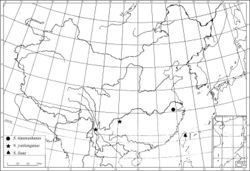Sinosciapus
| Notice: | This page is derived from the original publication listed below, whose author(s) should always be credited. Further contributors may edit and improve the content of this page and, consequently, need to be credited as well (see page history). Any assessment of factual correctness requires a careful review of the original article as well as of subsequent contributions.
If you are uncertain whether your planned contribution is correct or not, we suggest that you use the associated discussion page instead of editing the page directly. This page should be cited as follows (rationale):
Citation formats to copy and paste
BibTeX: @article{Yang2011ZooKeys159, RIS/ Endnote: TY - JOUR Wikipedia/ Citizendium: <ref name="Yang2011ZooKeys159">{{Citation See also the citation download page at the journal. |
Ordo: Diptera
Familia: Dolichopodidae
Name
Sinosciapus Yang, 2001 – Wikispecies link – Pensoft Profile
- Sinosciapus Yang, 2001: 432. Type species: Sinosciapus tianmushanus Yang, 2001 (monotypy).
Diagnosis
Eyes in both sexes narrowly separated, frons and face rather narrow (face less than 1/2 as wide as one eye, frons narrower than one eye). Vt strong. Clypeus apically separated from inner margin of eyes. Cheeks of females posteriorly with 1 black spine-like bristle. First flagellomere subtrapezoid or semicircular; arista subapical, slightly shorter than width of head. 5 strong dc, anterior 3 dc somewhat shorter; 5–7 irregularly paired acr very short and hair-like; scutellum with two pairs of strong sc, basal pair 2/3 as long as apical pair. Fore coxa with 3 bristles in male, with 3-4 spine-like bristles and many short spine-like bristles on inner surface in female. Wing: m-cu straight. Male genitalia rather small with well developed cercus like in Condylostylus.
Remarks
Sinosciapus is an Asian genus, with three known species from subtropical or tropical forests of Southwest China and South China (Fig. 5). It is similar to Amblypsilopus in following points: arista rather short, shorter than head width; tibial chaetotaxy often weak, especially in males; m-cu usually straight. But it can be separated from the latter by the following features: eyes in both sexes narrowly separated, frons and face rather narrow (frons narrower than one eye); both sexes with strong vt; lateral sc strong, about 2/3 as long as apical one; fore tarsomere 5 with 1 elongated spine-like claw. In Amblypsilopus, the eyes in both sexes are widely separated, the frons and face are rather wide (frons wider than one eye), the male vertex has vt weak or lost; the lateral sc is always reduced to the weak hairs or lost; the claws on fore tarsomere 5 are normal (Bickel 1994[1]; Yang et al. 2011[2]).
Key to world species (males) of the genus Sinosciapus
Taxon Treatment
- Yang, D; Zhu, Y; 2011: Sinosciapus from Taiwan with description of a new species (Diptera, Dolichopodidae) ZooKeys, 159: 11-18. doi
Other References
- ↑ Bickel D (1994) The Australian Sciapodinae (Diptera: Dolichopodidae), with a review of the Oriental and Australasian faunas, and a world conspectus of the subfamily. Records of the Australian Museum,Supplement 21: 1-394.
- ↑ Yang D, Zhang L, Wang M, Zhu Y (2011) Fauna Sinica Insecta Vol. 53. Diptera Dolichopodidae. Science Press, Beijing, 1912 pp.
Images
|
